How to stop tendingum.com notifications/adverts
Notification SpamAlso Known As: Ads by tendingum.com
Get free scan and check if your device is infected.
Remove it nowTo use full-featured product, you have to purchase a license for Combo Cleaner. Seven days free trial available. Combo Cleaner is owned and operated by RCS LT, the parent company of PCRisk.com.
What kind of page is tendingum[.]com?
Tendingum[.]com is a rogue webpage discovered by our researchers during a routine inspection of suspicious sites. This page is designed to promote browser notifications spam and redirect users to other (likely dubious/dangerous) websites.
The majority of visitors to tendingum[.]com and analogous webpages access them through redirects generated by sites employing rogue advertising networks.
![tendingum[.]com pop-up redirects](/images/stories/screenshots202510/tendingum-com-website-main.jpg)
Tendingum[.]com overview
At the time of research, tendingum[.]com displayed a basic CAPTCHA verification test. However, the content encountered on and through rogue sites might differ depending on visitors' IP addresses (geolocations). The verification on tendingum[.]com is an imitation – hence, once a user selects the "Allow" option, they unintentionally permit the webpage to deliver browser notifications.
Rogue websites use their notifications to run intrusive advertisement campaigns. These ads can promote online scams (technical support, phishing, etc.), untrustworthy/harmful software (adware, fake antivirus tools, PUAs, browser hijackers, etc.), and malware (ransomware, trojans, etc.).
To summarize, via pages like tendingum[.]com – users may experience system infections, serious privacy issues, financial losses, and even identity theft.
| Name | Ads by tendingum.com |
| Threat Type | Push notifications ads, Unwanted ads, Pop-up ads |
| Detection Names | N/A (VirusTotal) |
| Serving IP Address | 44.218.245.125 |
| Observed Domains | tmaw8a.tendingum[.]com; 9klsip.tendingum[.]com; 9m7uij.tendingum[.]com; alsi6e.tendingum[.]com; hkol7w.tendingum[.]com; oov7vc.tendingum[.]com; p9nswm.tendingum[.]com. |
| Symptoms | Seeing advertisements not originating from the sites you are browsing. Intrusive pop-up ads. Decreased Internet browsing speed. |
| Distribution Methods | Deceptive pop-up ads, false claims within visited websites, potentially unwanted applications (adware). |
| Damage | Decreased computer performance, browser tracking - privacy issues, possible additional malware infections. |
| Malware Removal (Windows) |
To eliminate possible malware infections, scan your computer with legitimate antivirus software. Our security researchers recommend using Combo Cleaner. Download Combo CleanerTo use full-featured product, you have to purchase a license for Combo Cleaner. 7 days free trial available. Combo Cleaner is owned and operated by RCS LT, the parent company of PCRisk.com. |
Browser notification spam in general
We have analyzed thousands of rogue websites; eroronf.co[.]in, unsfeths[.]com, and chessermanic[.]com are just a couple of our newest articles. These pages aim to deceive visitors into permitting browser notification delivery.
Adverts of this kind endorse deceptive and malicious content. While legitimate products or services may be encountered via spam notifications, they are unlikely to be promoted by their actual developers or other official parties. It is most probable that this promotion is undertaken by scammers who abuse the endorsed content's affiliate programs to acquire illegitimate commissions.
How did tendingum[.]com gain permission to deliver spam notifications?
Websites can only display browser notifications with user consent. Hence, you have likely entered tendingum[.]com at some point and clicked "Allow", "Allow Notifications", or a similar option – thereby permitting the advertisement delivery.
How to prevent deceptive sites from delivering spam notifications?
To avoid receiving undesirable or deceptive browser notifications – do not enable questionable webpages to deliver them (i.e., do not click "Allow", "Allow Notifications", etc.). Instead, deny notification delivery from such pages (i.e., select "Block", "Block Notifications", etc.) or ignore these requests in their entirety.
It is noteworthy that having adware installed on the browser or system may result in suspicious websites being forced-open at random. Should you keep experiencing redirects of this kind, check the device and immediately remove all dubious applications and browser extensions/plug-ins.
If your computer is already infected with rogue applications, we recommend running a scan with Combo Cleaner Antivirus for Windows to automatically eliminate them.
Screenshot of a notification (advertisement) displayed by the tendingum[.]com website:
![Ad delivered by the tendingum[.]com webpage](/images/stories/screenshots202510/tendingum-com-website-delivered-ad.jpg)
Appearance of the tendingum[.]com website (GIF):
![tendingum[.]com website appearance (GIF)](/images/stories/screenshots202510/tendingum-com-website-appearance.gif)
Instant automatic malware removal:
Manual threat removal might be a lengthy and complicated process that requires advanced IT skills. Combo Cleaner is a professional automatic malware removal tool that is recommended to get rid of malware. Download it by clicking the button below:
DOWNLOAD Combo CleanerBy downloading any software listed on this website you agree to our Privacy Policy and Terms of Use. To use full-featured product, you have to purchase a license for Combo Cleaner. 7 days free trial available. Combo Cleaner is owned and operated by RCS LT, the parent company of PCRisk.com.
Quick menu:
- What is Ads by tendingum.com?
- STEP 1. Remove spam notifications from Google Chrome
- STEP 2. Remove spam notifications from Google Chrome (Android)
- STEP 3. Remove spam notifications from Mozilla Firefox
- STEP 4. Remove spam notifications from Microsoft Edge
- STEP 5. Remove spam notifications from Safari (macOS)
Disable unwanted browser notifications:
Video showing how to disable web browser notifications:
 Remove spam notifications from Google Chrome:
Remove spam notifications from Google Chrome:
Click the Menu button (three dots) on the right upper corner of the screen and select "Settings". In the opened window select "Privacy and security", then click on "Site Settings" and choose "Notifications".
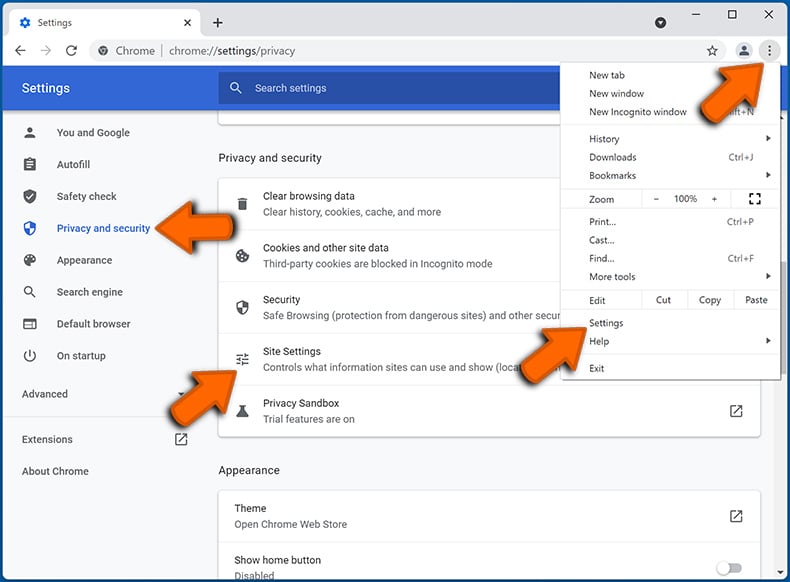
In the "Allowed to send notifications" list search for websites that you want to stop receiving notifications from. Click on the three dots icon near the website URL and click "Block" or "Remove" (if you click "Remove" and visit the malicious site once more, it will ask to enable notifications again).
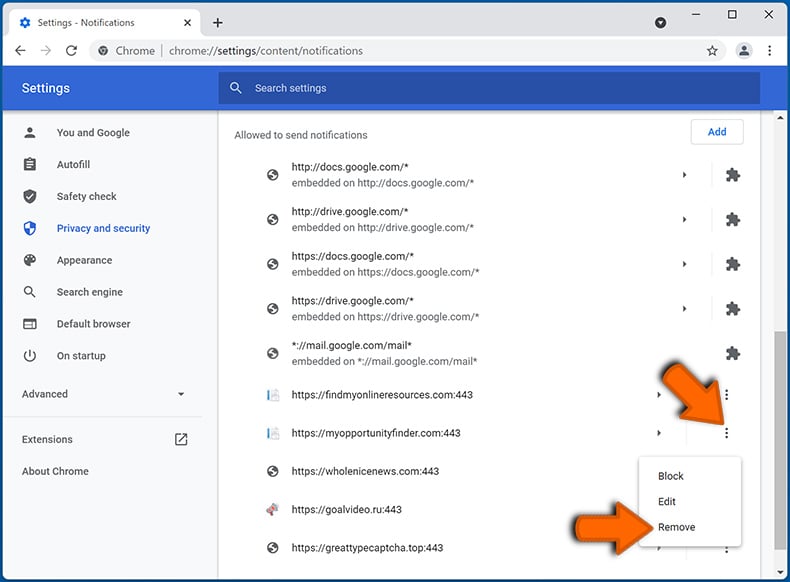
 Remove spam notifications from Google Chrome (Android):
Remove spam notifications from Google Chrome (Android):
Tap the Menu button (three dots) on the right upper corner of the screen and select "Settings". Scroll down, tap on "Site settings" and then "Notifications".
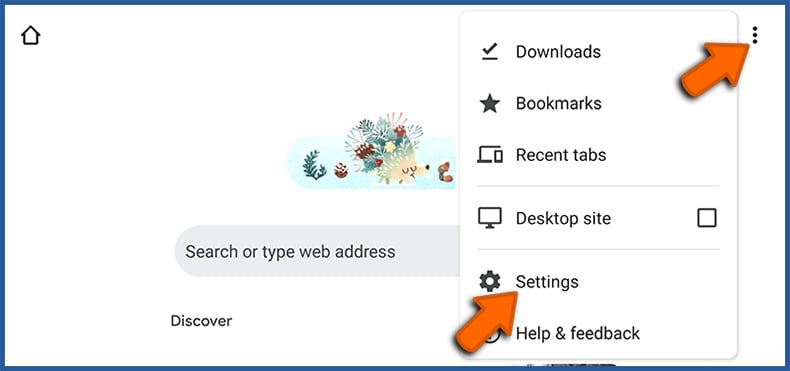
In the opened window, locate all suspicious URLs and tap on them one-by-one. Once the pop-up shows up, select either "Block" or "Remove" (if you tap "Remove" and visit the malicious site once more, it will ask to enable notifications again).
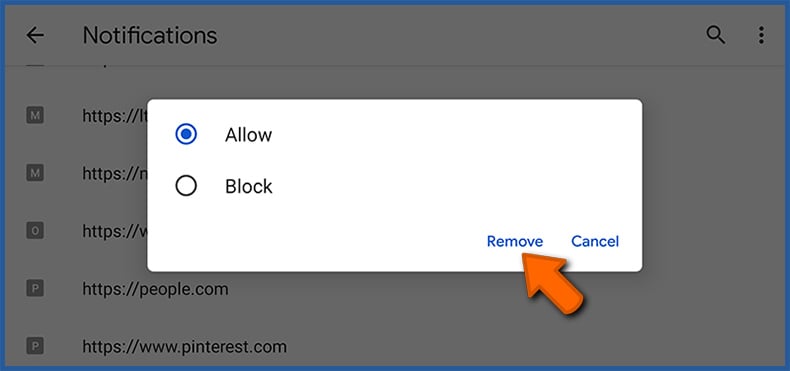
 Remove spam notifications from Mozilla Firefox:
Remove spam notifications from Mozilla Firefox:
Click the Menu button (three bars) on the right upper corner of the screen. Select "Settings" and click on "Privacy & Security" in the toolbar on the left hand side of the screen. Scroll down to the "Permissions" section and click the "Settings" button next to "Notifications".
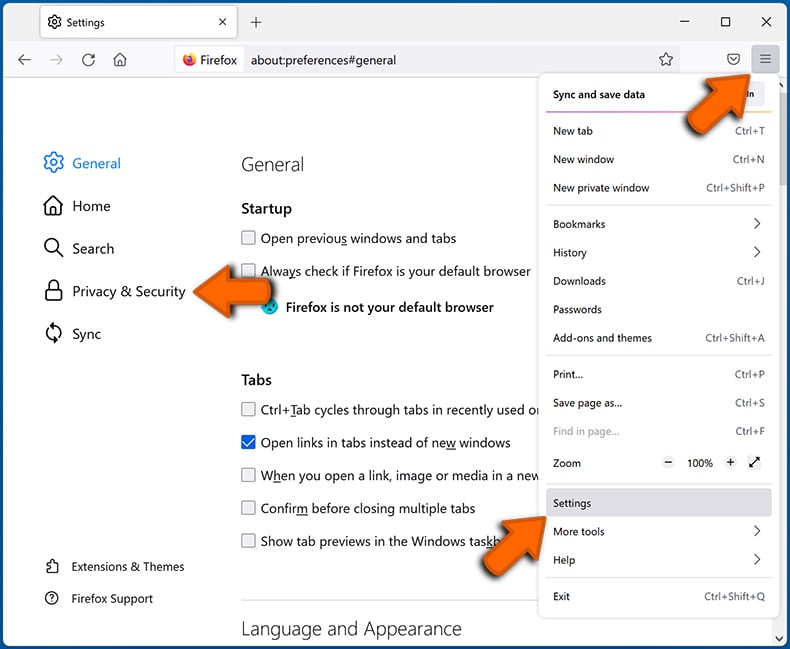
In the opened window, locate all suspicious URLs and block them using the drop-down menu or either remove them by clicking "Remove Website" at the bottom of the window (if you click "Remove Website" and visit the malicious site once more, it will ask to enable notifications again).
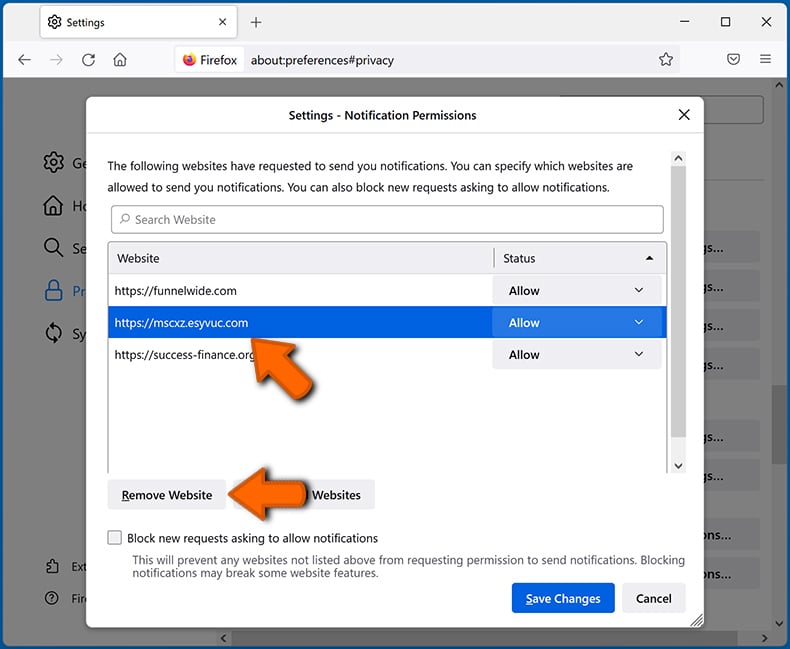
 Remove spam notifications from Microsoft Edge:
Remove spam notifications from Microsoft Edge:
Click the menu button (three dots) on the right upper corner of the Edge window and select "Settings". Click on "Cookies and site permissions" in the toolbar on the left hand side of the screen and select "Notifications".
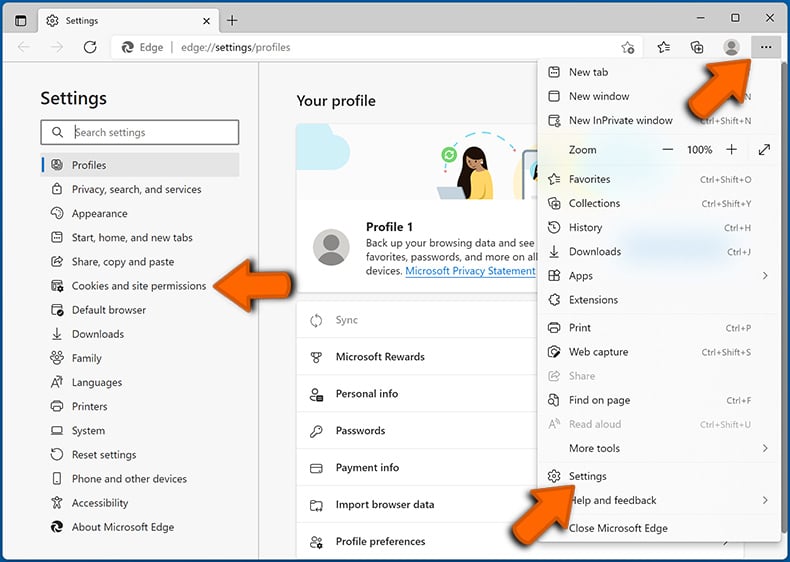
Click three dots on the right hand side of each suspicious URL under "Allow" section and click "Block" or "Remove" (if you click "Remove" and visit the malicious site once more, it will ask to enable notifications again).
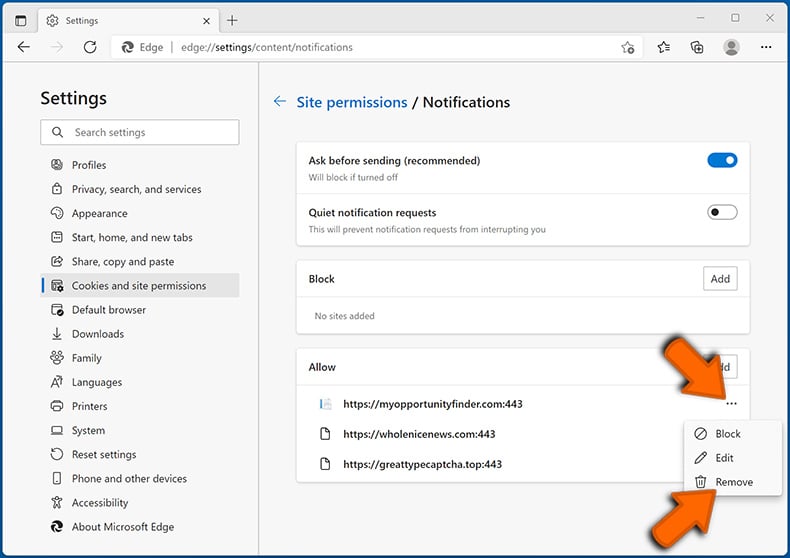
 Remove spam notifications from Safari (macOS):
Remove spam notifications from Safari (macOS):
Click "Safari" button on the left upper corner of the screen and select "Preferences...". Select the "Websites" tab and then select "Notifications" section on the left pane.
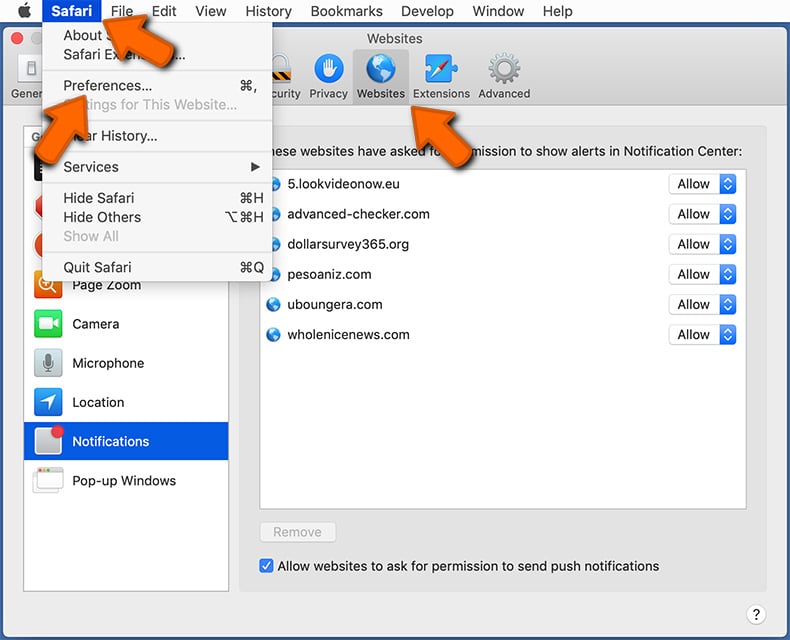
Check for suspicious URLs and apply the "Deny" option using the drop-down menu or either remove them by clicking "Remove" at the bottom of the window (if you click "Remove" and visit the malicious site once more, it will ask to enable notifications again)
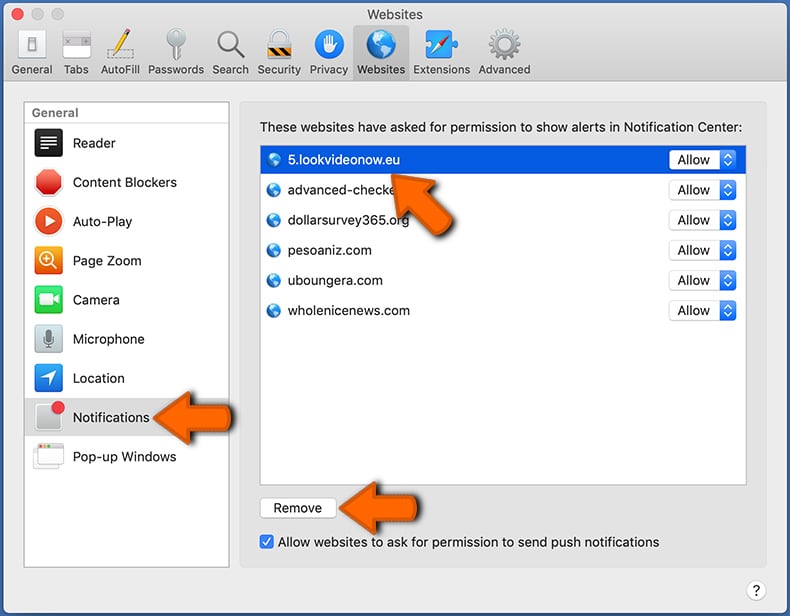
How to avoid browser notification spam?
Internet users should be very skeptical when being asked to allow notifications. While this is a useful feature that allows you to receive timely news from websites you like, deceptive marketers frequently abuse it.
Only allow notifications from websites that you fully trust. For added security - use an anti-malware application with a real-time web browsing monitor to block shady websites that tries to trick you into allowing spam notifications. We recommend using Combo Cleaner Antivirus for Windows.
Frequently Asked Questions (FAQ)
Why am I seeing ads (browser notifications) delivered by tendingum[.]com in the right lower corner of my desktop?
User consent is necessary for any website to display browser notifications (ads). Hence, you have likely visited tendingum[.]com and selected "Allow", "Allow Notifications", or an analogous option.
I have clicked on notification ads, is my computer infected?
No, clicking on a browser notification will not initiate any malware download/installation processes. However, these adverts can endorse content that is capable of causing system infections and other serious problems.
Is tendingum[.]com a virus?
No, tendingum[.]com is not classed as a virus. However, webpages of this kind commonly promote virulent content (e.g., online scams, unreliable/hazardous software, malware, etc.).
Will Combo Cleaner remove tendingum[.]com ads automatically or manual steps are still required?
Yes, Combo Cleaner can scan devices and remove the permissions given to the tendingum[.]com page. It can also block further access to this and other rogue, deceptive, and malicious sites. Therefore, additional steps will not be necessary.
Share:

Tomas Meskauskas
Expert security researcher, professional malware analyst
I am passionate about computer security and technology. I have an experience of over 10 years working in various companies related to computer technical issue solving and Internet security. I have been working as an author and editor for pcrisk.com since 2010. Follow me on Twitter and LinkedIn to stay informed about the latest online security threats.
PCrisk security portal is brought by a company RCS LT.
Joined forces of security researchers help educate computer users about the latest online security threats. More information about the company RCS LT.
Our malware removal guides are free. However, if you want to support us you can send us a donation.
DonatePCrisk security portal is brought by a company RCS LT.
Joined forces of security researchers help educate computer users about the latest online security threats. More information about the company RCS LT.
Our malware removal guides are free. However, if you want to support us you can send us a donation.
Donate
▼ Show Discussion